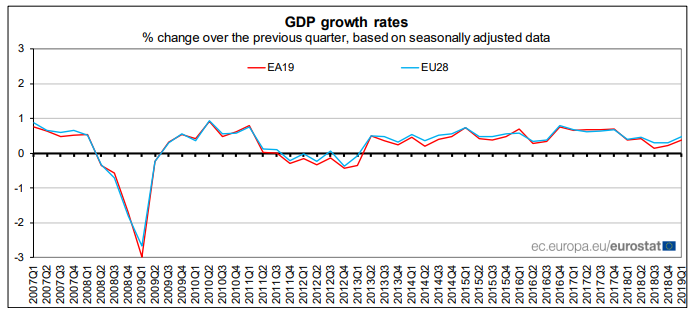Carlo Altavilla, Desislava C. Andreeva, Miguel Boucinha and Sarah Holton (2019), “Monetary policy, credit institutions and the bank lending channel in the euro area”, ECB Occasional Paper Series No 222, Μάιος As the euro area has a predominantly bank-based financial system, changes in the composition and strength of banks’ balance sheets can have very sizeable implications for the transmission of monetary policy. This paper provides an overview of developments in …Read More
Euro area annual inflation up to 1.7%
Eurostat/Euro area annual inflation up to 1.7%/3 Μαϊου 2019 Euro area annual inflation is expected to be 1.7% in April 2019, up from 1.4% in March according to a flash estimate from Eurostat, the statistical office of the European Union. Σχετικές Αναρτήσεις Eurostat/Annual inflation down to 1.4% in the euro area/17 Απριλίου 2019 Eurostat/Euro area annual inflation down to 1.4%/1 Απριλίου 2019
Low productivity jobs continue to drive employment growth
OECD, (2019), “Low productivity jobs continue to drive employment growth”, 29 Απριλίου Employment is rising in OECD countries but most jobs continue to be created in relatively low-productivity, low-wage activities, says a new OECD report. The latest Compendium of Productivity Indicators says the trend has compounded the impact of generally weak business investment on productivity growth. The downward pressure on wages may have allowed firms to defer investment decisions, instead …Read More
EU enlargement 15th anniversary: Upward steps on the income ladder
Zsolt Darvas, (2019), “EU enlargement 15th anniversary: Upward steps on the income ladder”, Bruegel, 30 Απριλίου Since their accession to the EU 15 years ago, the incomes of most central Europeans have increased faster than the incomes of longer-standing members and, thereby, they moved upwards in the EU distribution of income. Yet the very poorest people have not progressed in some countries. Σχετικές Αναρτήσεις Thomas Blanchet, Lucan Chancel and Amory …Read More
GDP up by 0.4% in the euro area and by 0.5% in the EU28
Eurostat/GDP up by 0.4% in the euro area and by 0.5% in the EU28/30 Απριλίου 2019 Seasonally adjusted GDP rose by 0.4% in the euro area (EA19) and by 0.5% in the EU28 during the first quarter of 2019, compared with the previous quarter, according to a preliminary flash estimate published by Eurostat, the statistical office of the European Union. In the fourth quarter of 2018, GDP had grown by …Read More
Unemployment rates in the EU regions ranged from 1.3% to 35.1%
Eurostat/Unemployment rates in the EU regions ranged from 1.3% to 35.1%/29 Απριλίου 2019 More than 80% of the NUTS 2 regions of the European Union (EU) saw their unemployment rate for persons aged 15-74 fall in 2018compared with 2017. Around60%recorded a decrease of at least 0.5 percentage points. However, regional unemployment rates continued to vary widely across the EU regions, with the lowest rates recorded in two Czech regions Prague …Read More
Euro area architecture: What reforms are still needed, and why
Agnès Bénassy-Quéré, Markus K Brunnermeier, Henrik Enderlein, Emmanuel Farhi, Marcel Fratzscher, Clemens Fuest, Pierre-Olivier Gourinchas, Philippe Martin, Jean Pisani-Ferry, Hélène Rey, Isabel Schnabel, Nicolas Véron, Beatrice Weder di Mauro, Jeromin Zettelmeyer, (2019), “Euro area architecture: What reforms are still needed, and why”, VoxEU, 1 Μαϊου In January 2018, CEPR published a Policy Insight recommending euro area reforms which received broad support as well as some criticism. In this column, the …Read More
Αναπάντεχη ανάκαμψη της Ευρωζώνης το πρώτο τρίμηνο
Η Καθημερινή, (2019), “Αναπάντεχη ανάκαμψη της Ευρωζώνης το πρώτο τρίμηνο”, 2 Μαϊου Ανέκαμψε, αναπάντεχα, η οικονομία της Ευρωζώνης το πρώτο τρίμηνο του 2019, καθώς η Ιταλία βγήκε από την ύφεση, ενώ φαίνεται πως και η γερμανική οικονομία είχε καλύτερη από το αναμενόμενο πορεία τους προηγούμενους μήνες. Σχετικές Αναρτήσεις Νατάσα Στασινού, (2019), «Γιατί η γερμανική οικονομία ασθενεί και πώς μεταδίδει τον ιό στην Ευρωζώνη», Naftemporiki.gr, 10 Απριλίου Η Καθημερινή, (2019), «Η …Read More
When Facts Change, Change the Pact
Jean Pisany-Ferry, (2019), “When Facts Change, Change the Pact”, Project Syndicate, 29 Απριλίου “When facts change, I change my mind,” John Maynard Keynes famously said. With long-term interest rates currently near zero, the European Union should reform its fiscal framework to allow member states to increase their debt-financed public investments. Σχετικές Αναρτήσεις Xavier Timbeau, (2019), «The sustainability imperative—how really to assess the European economy», Social Europe, 10 Απριλίου Paul Taylor, …Read More
The Real Crisis Risk at the ECB
Ferdinando Giugliano, (2019), “The Real Crisis Risk at the ECB”, Bloomberg Opinion, 24 Aπριλίου The euro zone has only recently recovered from a double-dip recession, but there are already questions about how prepared it would be for a new crisis. All eyes are on the European Central Bank, which has been the strongest line of defense against an economic slowdown. While pessimists worry that the ECB has few tools left if …Read More







